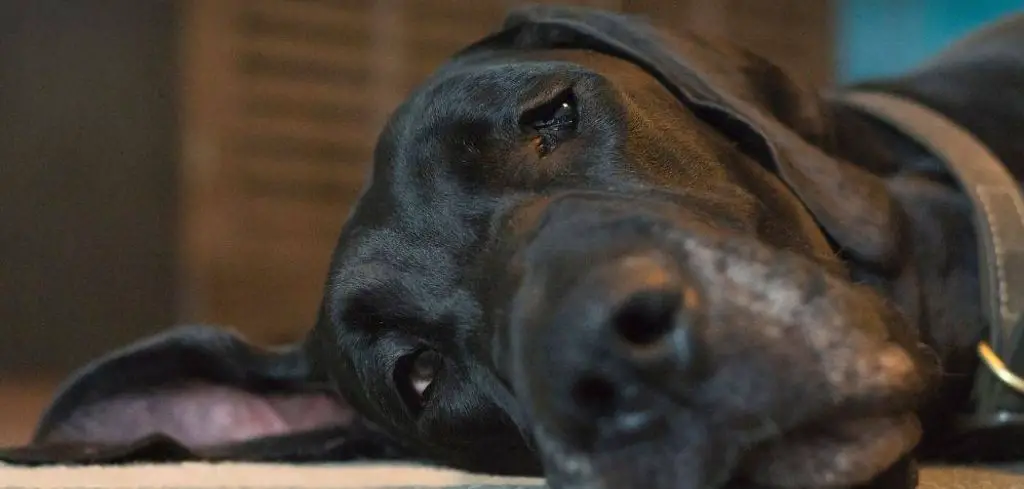A dog that excessively swallows at night can leave owners worried and confused. This behavior may indicate anything from digestive discomfort to more serious medical conditions.
We outline the common causes of excessive swallowing in dogs at night, what you can do, and when to seek veterinary help.
Table of Contents
Dog Excessive Swallowing at Night — Why It Happens
Excessive swallowing at night in dogs is usually linked to gastrointestinal upset, nausea, acid reflux, or even underlying health issues such as throat irritation or dental problems. Some dogs swallow repeatedly due to post-nasal drip, while others may experience nighttime reflux when lying down.
Anxiety, dehydration, or ingestion of foreign material can also contribute to this symptom.
Because this behavior often happens when the household is quiet, owners may notice it more clearly during the night.

Excessive Swallowing in Dogs at Night: Common Causes
Acid Reflux
Acid reflux is a frequent cause of nighttime swallowing. When stomach acid flows back into the esophagus, it creates irritation that can trigger repeated licking and swallowing.
Dogs may also pace, drool, or cough when reflux is severe. Nighttime makes symptoms worse because lying flat allows stomach acid to move upward more easily. Long-term reflux can damage the esophagus and make eating painful.
Read more: Dog Extremely Anxious at Night (Why it happens)
Nausea
Nausea from various causes can cause a dog to swallow excessively. Dogs often swallow to suppress the urge to vomit.
This can stem from eating spoiled food, dietary changes, or conditions such as pancreatitis or kidney disease. At night, nausea may appear more obvious as the stomach is empty and irritation builds.
Post-Nasal Drip or Allergies
Excess mucus from allergies, sinus infections, or respiratory conditions can cause post-nasal drip. This mucus drips down the throat, prompting repeated swallowing.
Owners might also notice coughing, sneezing, or noisy breathing. Symptoms may worsen at night when a dog is lying down and mucus collects more easily.
Foreign Body or Throat Irritation
Something lodged in the throat, such as a small bone or piece of toy, can cause excessive swallowing. Even mild throat irritation from kennel cough or viral infections can trigger the same behavior.
A dog may also gag, hack, or paw at its mouth. This situation can be serious if it blocks the airway or causes persistent discomfort.
Dental Disease
Oral pain or infection can lead to excessive swallowing, especially at night when chewing and saliva production decrease. Dogs with bad teeth or gum disease often swallow more to cope with discomfort.
Other signs may include drooling, pawing at the mouth, or reluctance to eat. Dental disease can also lead to infections spreading deeper into the body if left untreated.
Anxiety or Stress
Anxious dogs may swallow excessively as a self-soothing behavior. Nighttime can be particularly stressful if the dog dislikes being alone, hears noises outside, or suffers from separation anxiety.
Excessive swallowing linked to stress is often paired with restlessness, whining, or pacing. While not always medical, it can cause long-term health strain if not managed.
What to Do If Your Dog Is Excessively Swallowing at Night
If your dog is swallowing excessively at night, start by observing any additional signs such as drooling, gagging, vomiting, or restlessness. Keep track of whether the behavior happens after meals or only during sleep.
Avoid feeding right before bedtime, as a full stomach can worsen reflux. Instead, offer smaller, earlier meals to reduce acid buildup.
Provide plenty of fresh water throughout the day to prevent dehydration and help ease throat irritation. Consider elevating your dog’s food and water bowls to support digestion.
Create a calm nighttime environment. Reducing stressors like loud noises and separation can ease anxiety-driven swallowing. Soft bedding and a quiet space can make a big difference.
Lastly, never ignore persistent symptoms. If swallowing continues for more than a night or two, it’s best to schedule a veterinary appointment.
When to Call or Visit Your Vet
You should contact your veterinarian if your dog’s excessive swallowing is persistent, worsens quickly, or is accompanied by other concerning signs.
If your dog is gagging, coughing, or appears unable to swallow properly, seek immediate veterinary care. These can be signs of a blockage or severe throat irritation.
Vomiting, refusal to eat, drooling, or signs of pain when swallowing also require prompt evaluation. These may indicate reflux disease, infections, or dental issues that need treatment.
Dogs with underlying health conditions such as kidney disease, diabetes, or chronic gastrointestinal problems should be monitored especially closely. Nighttime swallowing may reveal worsening illness.
Read more: Dog Excessively Licking Lips and Swallowing (What this means)
Key Takeaway
Excessive swallowing at night in dogs can stem from digestive upset, reflux, mucus buildup, dental pain, or even stress.
While some causes may be mild, others point to serious conditions that require medical attention.
Monitoring patterns, adjusting feeding times, and reducing nighttime stress can sometimes help.
But if swallowing continues or other symptoms develop, the safest step is to seek veterinary guidance.
With timely care, most dogs experiencing this nighttime behavior can be kept comfortable and healthy.
